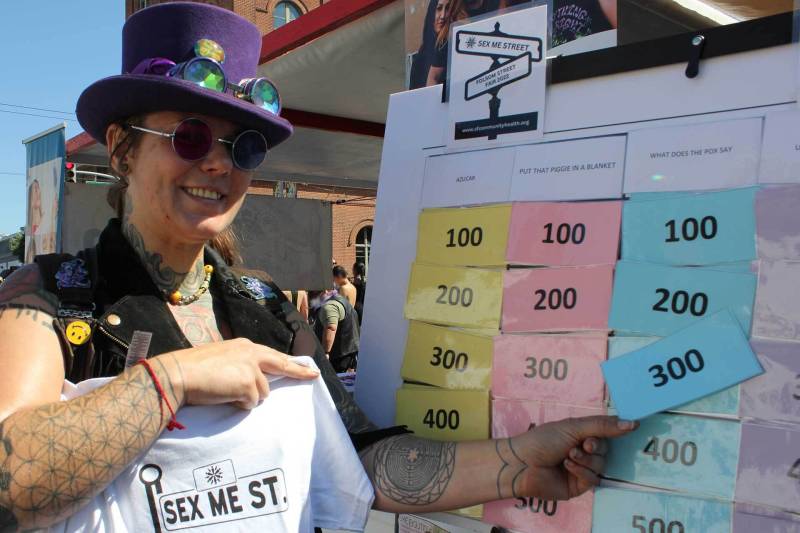Violet Moon of San José, clad in a black leather harness, said many events over the summer were postponed. Moon, who is gender-fluid, said the “Horse Market” finally took place this weekend, just before the fair.
“In the communities I’m in, I know that they did react quickly to it,” said Moon. “For example, there was a party that was supposed to happen around the time when MPX was first spiking, even before it had become a real worry on the national arena. And they went ahead and canceled that just out of an abundance of caution.”
Fair first-timer Will Smyack said he and his partner decided to limit their sexual contacts as a precaution.
“[We] were open for a little bit, but because of monkeypox and everything, we’re not anymore just to be safe,” said Smyack. “But hopefully the vaccination can help. Not just us, but everybody.”
Others said they simply tried to educate themselves on the symptoms and science of the latest virus, and adapt.
“In the kink scene that I belong to, we just had a rule about putting towels down on public furniture, basically making sure no naked body parts are touching surfaces,” said a festivalgoer who asked to go by “L,” because she described herself as a member of the “horny community” and said she’s in the running for a job as an elementary school teacher.
L was seated in a folding chair outside the gates of the Folsom Street Fair with bunny ears, a bra and matching panties, and a fresh Band-Aid on her upper arm. She’d just gotten her MPX vaccine at one of two city Department of Public Health pop-up vaccine clinics at the fair; SFDPH came prepared with 2,000 doses, and the convenient offering seemed to be a draw for many.
UCSF Professor of Medicine and Infectious Disease Specialist Peter Chin-Hong said when MPX came on the scene, San Francisco was instrumental in pushing the state and then the federal government to declare MPX an emergency to, for example, unlock resources for vaccines.
“I think it was probably a month before vaccines started trickling in, in higher and higher numbers. It was an agonizing month,” said Chin-Hong.
He said the revelation that one dose could be divided up to five times and administered under the skin was another coup. But there were other lessons learned from the city’s response to MPX: Chin-Hong said that, initially, the message from public health officials was too vague, in their effort to be sex-positive and not stigmatize men and transpeople who have sex with men. More recently, he said, they’ve gotten specific, something he said has likely led to 50% of that population voluntarily reducing their sexual behavior.
“It was kind of average, just like, you know, here are the 12 ways you can get MPX,” said Chin-Hong. He said that’s changed to “… you can protect yourself by reducing the number of sexual partners, by cleaning your sex toys … I think the message did get out as to how you got it. You didn’t get it from a thrift store. You didn’t get it from doing yoga in an overheated Bikram yoga studio. You got it from intimate contact for hours. And that was the way that you protected yourself in the absence of not having enough vaccines.”
Chin-Hong said having vaccine clinics at events like Folsom Street Fair became a strategy to correct another challenge: the disproportionate presence of MPX among Black and Latino men.
“If you’re lining up in a public line at [San Francisco] General [Hospital] to get a vaccine, everybody knows what group you’re part of. Maybe you’re not comfortable with that. So I think that’s still a big barrier and probably why there’s a bigger divide between minority populations and the general population,” said Chin-Hong, “I remember people were wearing hoodies in line because they just didn’t want to be seen.”
Just a stone’s throw down Folsom Street, contestants tried their luck at winning a free T-shirt via the San Francisco Community Health Center’s public health “Jeopardy” game. The game featured an MPX category with questions like, “What is the Monkeypox incubation period?” (According to the CDC, the answer is three to 17 days). It was part of a targeted outreach and street medicine campaign, executed by community groups and public health staff, and it seemed to be bearing fruit. But with cases still circulating and the likelihood they will rise again at some point, health experts say it’s still too early to put down one’s guard.

